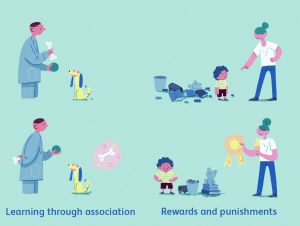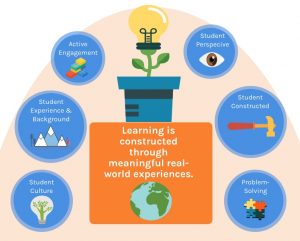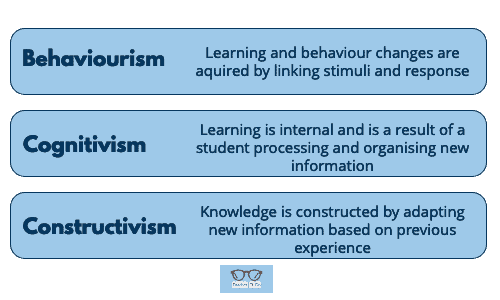Theories of Learning
I am an engineer by profession and a teacher by passion. Being from an engineering background I never tried to focus on the theories of learning. While pursuing my master’s of engineering, I started teaching undergrad students and at that time as well I was keeping myself updated in terms of technical/course knowledge. I never thought about learning theories or other teaching pedagogies. During those days, I followed the teaching practice which involved long teacher-oriented classes and less student-oriented ones. The reason for using that pedagogy was that during my undergrad days my professors also followed the same method. Being a young teacher, I was not able to judge my inadequacy. After a few years, I got an opportunity to join a teacher training program which was conducted by Swiss Trainers. They taught me several tools and also Edgar’s Cone of Learning. During this training, I came across these three words i.e. Behaviourism, Cognitivism, and Constructivism.
So, what do these terms stand for?
Behaviourism 
This term came into existence from the work of B.F. Skinner. It is focused on observable behaviour and sometimes measurable behaviours. Through this term, it is believed that actual learning occurs when changes in behaviours or new behaviours are acquired through the connection between stimuli and responses. This connection results in a behaviour change. Ertmer & Newby mentioned that behaviourism equates learning with changes in either the form or frequency of observable performance. They also wrote that learning is accomplished when a proper response is demonstrated. Teachers use this theory when they reward or punish students’ behaviours. This learning theory can be used in class through repetitive practice, drill work, establishing rules, or verbal reinforcement.
Cognitivism 
It is focused on how students learn. This theory is largely based on the work of Jean Piaget, who didn’t support the idea of behaviourism. The cognitive theory explained how the mind works during the learning process. This focuses on the student’s learning process and how the information he has attained is received and utilized. It suggests that children move through four different stages of learning and as the child grows his intelligence changes. The four stages are Sensorimotor, Preoperational, Concrete operational, and Formal operational stage. Piaget believed that the more kids interact with the world around them more they add new knowledge to the existing knowledge. This theory can be used in the classroom by giving students real-world examples, discussions, analogies, or by linking concepts.
 Constructivism
Constructivism
It focuses on learners’ role in their learning. According to Ertmer & Newby constructivists do not share with cognitivists and behaviourists the belief that knowledge is mind-independent and can be “mapped” onto a learner. Constructivists do not deny the existence of the real world but contend that what we know of the world stems from our interpretations of our experiences. This theory refers to the learner as a constructor of knowledge. These classrooms are more students centred and the teacher acts as a facilitator. Constructivists believe that in the process of learning learners construct new ideas based on prior knowledge or experience. It is focused on preparing the learners to attain problem-solving skills. The outcomes are not predictable of these types of knowledge because every learner has their way of learning and attaining knowledge. This can be used in class for group work, brainstorming activities, or problem-based learning.

Why do we need learning theories?
- They give frameworks that help us to understand how information is used, how knowledge is created, and how actual learning takes place.
- It provides a basis to understand how students learn and also a way to describe, analyze and foresee learning.
- These theories provide space for different methods of teaching and also motivate the learner.
- Each theory offers a different way to understand the learner and his way of attaining knowledge.
To conclude, I would like to mention that these theories are important as it helps both learners and teacher. As an educator, while deciding which strategy to use it is important to consider the level of knowledge of the learner and the desired outcome.
–Thank You
I really appreciate how you’ve not only reflected on your personal development but also provided an overview that is accessible to those new to this field.